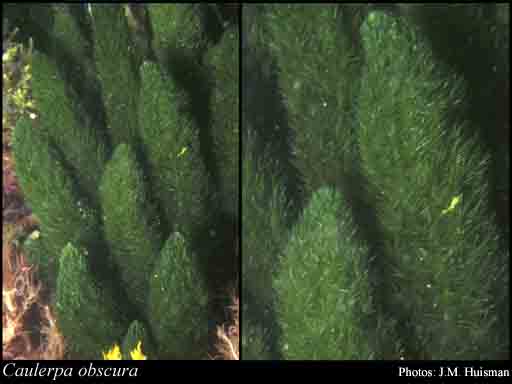- Reference
- Bot.Zeit. 50 (1845)
- Conservation Code
- Not threatened
- Naturalised Status
- Native to Western Australia
- Name Status
- Current

Scientific Description
Habit and structure. Stolon robust, (1–)2 mm in diameter, cartilaginous, bearing a sparse to moderate covering of simple or basally furcate, terete to tapering, spinous or rounded-tipped ramuli 1–2(–4) mm long, and 200–300 µm in diameter, directed forward towards the stolon apex, epilithic. Erect primary fronds dark green, with usually simple, occasionally branched axes, usually 10–25(–30) cm high and 2–5(–6) cm across; axes terete, 0.7–2 mm in diameter, bearing on all sides dense second-order laterals 1–3(–4) cm long which bear numerous ramuli irregularly arranged or sometimes tending to lie more-or-less in two rows; second-order laterals 350–450 µm in diameter. Ramuli 2–7(–10) mm long and 250–350 µm in diameter, terete, simple or furcate just below their apices, tapering abruptly to the tip which bears 1–3 single or divided spines.
Distribution. From Yanchep Beach. W. Aust., to Walkerville, Vic., and around Tas.
Habitat. Common in pools on rock platforms and in the upper sublittoral, under rough to moderate wave action, and recorded to 35 m deep.
[After Womersley, Mar. Benthic Fl. Southern Australia I: 265 (1984)]
Distribution
- IBRA Regions
- Esperance Plains, Geraldton Sandplains, Swan Coastal Plain, Warren.
- IBRA Subregions
- Geraldton Hills, Perth, Recherche, Warren.
- IMCRA Regions
- Abrolhos Islands, Central West Coast, Leeuwin-Naturaliste, WA South Coast.
- Local Government Areas (LGAs)
- Augusta Margaret River, Cockburn, Dandaragan, Esperance, Greater Geraldton, Irwin, Joondalup, Rockingham, Wanneroo.